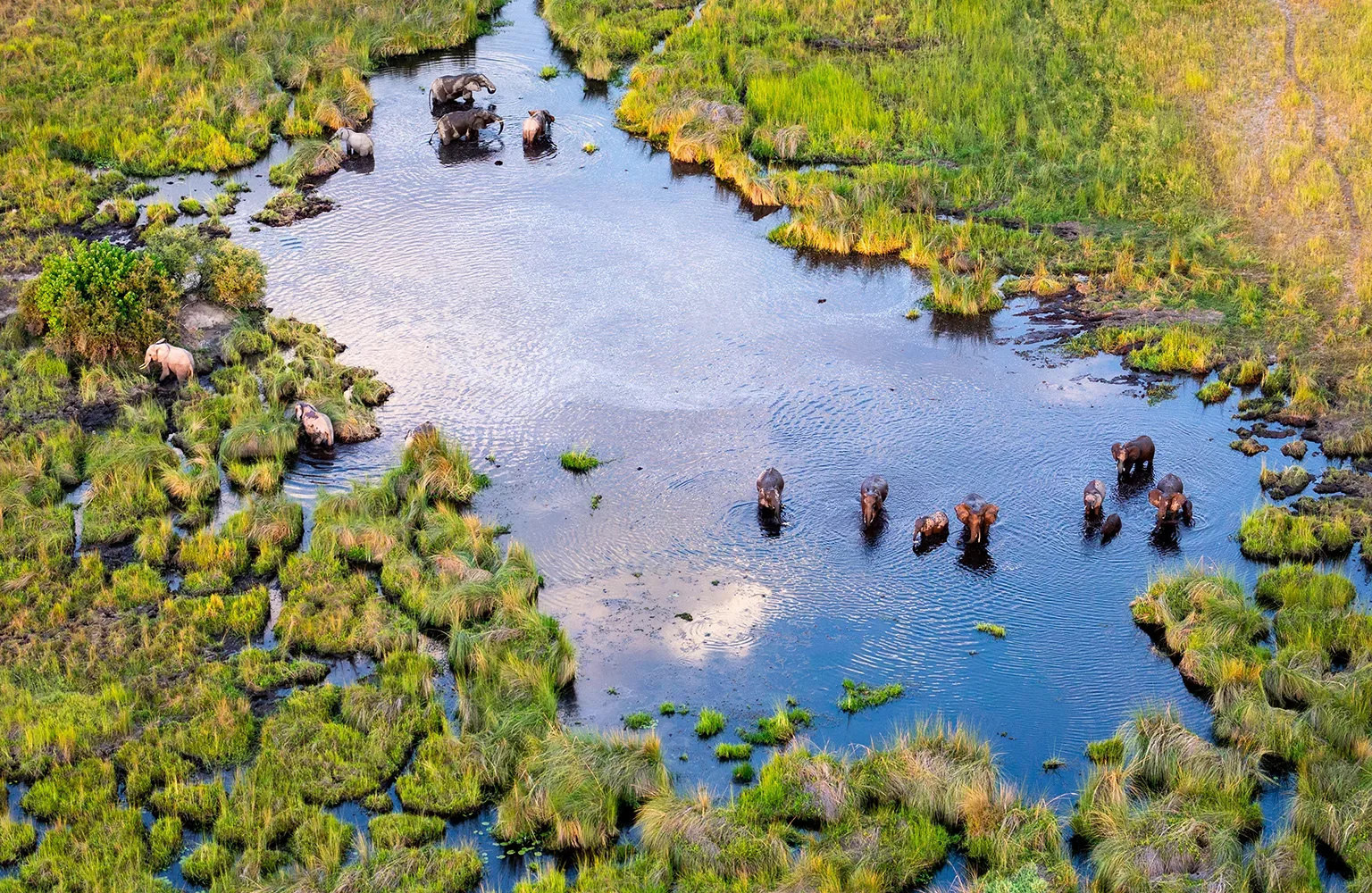One of the world’s greatest and most valuable wildlife areas, the Okavango Delta in Botswana, is under serious threat. Daniel Kaul, CEO of Natucate, an organisation dedicated to the preservation of Earth’s precious resources, emphasises the need to raise awareness and act now.
Botswana’s wildlife, and the tourism industry that depends on it, face an existential threat. The Okavango Delta, a UNESCO World Heritage Site and a hotbed of biodiversity, is at risk due to human demands on its water sources.
The Okavango Delta is one of the most dramatic wilderness areas on the planet. Situated on a fault-line, the Okavango Delta, and the wildlife it supports, are reliant on the seasonal flood water that flows in from neighbouring Namibia and Angola.
Yet, these water levels were at an all-time low in 2023 due to the confluence of evaporation caused by climate change, increased irrigation, planned hydroelectric dams, and oil projects upstream.
If water levels continue to drop as forecast, the Okavango Delta, like the Great Barrier Reef before it, could be the next great natural wonder resigned to the history books.
Botswana’s tourism industry, making up some 13 percent of the nation’s GDP and employing some 26,000 people, regards the Okavango Delta as its crown jewel. Of course, beyond the economic implications, the Okavango Delta’s biodiversity is essential for carbon sequestration, water filtration, and wildlife control.
In order to protect the human and animal livelihoods that depend on this region, we need greater inter-state water management planning if we are to preserve this essential biosphere.
The delicate ecosystem of the Okavango Delta relies on heavy annual flooding. However, with the construction of dams in Angola and large-scale oil projects in Namibia, the flow of water feels more like a trickle.
In addition, one drastic development in Angola is the plan to establish and irrigate a massive 221,000 hectares (ha) of farmland in the future. The water offtakes for irrigation during the dry months would entirely drain the Cubango River, one of the key water sources for the Okavango Delta.
Equally, the construction of large dams and the diversion of water into other areas could exacerbate the situation. As a result, the livelihoods of rural people throughout the Cubango/Okavango River Basin are being affected, with many migrating to urban centres in search of cash incomes and better living standards.
While it is undeniable that increased irrigation and hydroelectric dams provide essential resources and electricity for growing populations, we cannot ignore the fate of the Okavango Delta.
We urgently need to raise awareness about the decreasing water levels and advocate for a more rigorous water planning process. It is crucial to protect one of the world’s flagship biodiversity areas and ensure the sustainability of the tourism industry that contributes significantly to Botswana’s GDP.
Several pressing concerns require attention. First, we lack comprehensive data on the cumulative impact of water abstraction from various sources, including irrigation schemes, towns, and other offtakes. Governments must therefore determine the proportion of river water being removed and understand its impact on downstream life, including plants, animals, and people.
Equally, the potential pollution caused by pesticides, fertilisers, and industrial waste must be tracked and measured if we are to fully understand its effects on the ecosystem.
Moreover, the construction of large dams also raises concerns about the life-supporting flow of water into the Okavango Delta. We must evaluate the long-term effects of such infrastructure on the delicate balance of the ecosystem.
Additionally, with the unpredictability of rainfall due to climate change, the abstraction of water during periods of low rainfall poses further risks.
The recent summer of 2022 to 2023 serves as a reminder, as the expansion of irrigated areas upstream resulted in extremely low water levels in Rundu, potentially depleting the Cubango/Okavango even more than a decade ago.
RAISING AWARENESS
Given the critical role that the Cubango/Okavango River plays in supporting life, production, and the economy of the region, it is alarming how little we know about water flows, abstraction, and contamination.
Yet, it is exactly this lack of knowledge that highlights the lack of care taken towards this rich biosphere. Of course, the governments of Angola, Namibia, and Botswana, along with the Permanent Okavango River Basin Water Commission (OKACOM), must collaborate to make monitoring data public and raise awareness about any changes in water flows.
That’s why revising government policies and procedures in Angola and Namibia is crucial. We must move away from current practices that provide free land and water to influential developers in Angola while neglecting proper environmental considerations.
Similarly, the tourism sector has a role to play here. By being more vocal about the implications of these human activities, we can help to generate awareness and ultimately move the needle in the eyes of politicians on this key issue.
Furthermore, the Okavango Delta is not only an ecological treasure but also a prized tourism destination. We cannot afford to stand idly by as its water levels continue to decline. Robust, internationally agreed-upon, and well-researched water management protocols will be essential for its survival.
Effective water planning methods must be implemented to ensure the future of this delicate ecosystem and the wildlife that depends on it. The tourism industry relies on the preservation of the Okavango Delta’s unique beauty.
The Okavango Delta in Botswana holds a significant place in my heart due to its abundant wildlife and biodiversity. As I reflect on my many experiences there, the personal connection I feel is rooted in the remarkable richness of life that characterises this unique ecosystem. I believe it is our collective responsibility to act and protect this precious natural wonder before it’s too late.



























